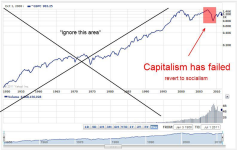Well said. I agree with all of your comments. There are two fallacies in the way most people explain capitalism - the first is the invisible hand/rational actors fallacy. One only has to spend one day trying to follow the stock market to appreciate how spurious that claim is. Share prices bounce all over the place, the market panics on various news events, and it shows "irrational exuberance" all of the time, creating volatile bubbles that burst unexpectedly.
The second fallacy is the fallacy of "equal information". The theory behind open markets is that participants have availability of information to make informed decisions - informed buyers and informed sellers reach mutually acceptable prices. That is just blatantly untrue. FTX, again, is a great example. All kinds of information was hidden from participants, but that is true of almost every major (and most minor) market player. Insiders have enormous advantages, officers hide information from the public to prop up share prices, markets for particular services or commodities get manipulated - even at the local level sellers hide information from buyers to prop up prices, like "sale" prices that are based upon fake MSRPs. Each of those manipulations skew markets, as do monopolies. The entire enterprise is inherently dishonest, especially when the players are not constrained by rules.
Then there are various outside pressures that also distort commerce, like wars, pestilence, and environmental disasters.


